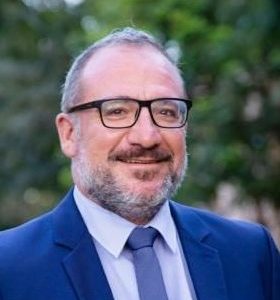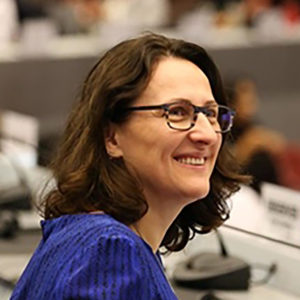Event Virtual
Chemicals and Waste Briefing

This briefing, organized within the framework of the Geneva Environment Network, provided an overview of the status of the negotiations related to chemicals and waste and upcoming important conferences.
About the Briefing
This Chemicals and Waste briefing, organized within the framework of the Geneva Environment Network, provided an overview of the work and key activities to advance the sound chemicals and waste management globally. It will also present the latest information on the important conferences scheduled in 2021 and 2022, including:
- The 15th meeting of the COP to the Basel Convention, the 10th meeting of the COP to the Rotterdam Convention and the 10th Meeting of the COP to the Stockholm Convention (BRS COPs), which will be held in two segments, an online segment in July 2021, and a face-to-face segment tentatively in June 2022, in Geneva.
- The 4th Meeting of the Conference of the Parties to the Minamata Convention on Mercury (COP-4), to be held in two segments, a first online segment within the period of 1 to 5 November 2021 and a second segment to be conducted in-person in the first quarter of 2022 in Bali, Indonesia.
- The 5th Session of the International Conference on Chemicals Management (ICCM5), postponed until further notice due to the sanitary conditions.
Speakers
By order of intervention

Bruno POZZI
Director, Europe Office, UNEP

Rolph PAYET
Executive Secretary, Basel Rotterdam and Stockholm Conventions

Monika STANKIEWICZ
Executive Secretary, Minamata Convention on Mercury

Marylene BEAU
Programme Officer, Governance Branch, Basel Rotterdam and Stockholm Conventions

Claudia TEN HAVE
Senior Policy Coordination Officer, Minamata Convention on Mercury

Sandra AVEROUS
Programme Management Officer, Chemicals and Health Branch, UNEP

Nalini SHARMA
SAICM Coordinator

Felix WERTLI
Head, Global Affairs Section, Swiss Federal Office for the Environment
Summary
Welcome and Introduction
Bruno POZZI, Director, Europe Office, UNEP
Our world is facing a triple planetary crisis – biodiversity loss, climate change and pollution -, and people everywhere are becoming more aware of the intertwined nature of these crises. To confront these human-made problems, the answer lies in human-driven solutions and multilateralism. Following a science-based approach to guide our action, we need to transform the way we produce and consume. Therefore, we need to change our economic model in order to achieve the goals of having a better planet, restoring ecosystems, invest in nature and at the end making peace with nature.
The links between pollution and chemicals area more than clear. The impacts on human health are also increasingly clear and understood. We need international processes to address these linkages and look at the way we use the power of chemicals and the science behind it.
Rolph PAYET, Executive Secretary, Basel Rotterdam and Stockholm Conventions
As we are approaching World Environment Day, making peace with nature should be our priority, and this applies to the management of chemicals and waste. We cannot ignore the astonishing amount of polluted land because of waste. Illegal dumpsites remain numerous, whether in developed or developing countries. We need to reclaim these areas and let the environment breathe and the species return.
As humans withdrew temporarily from some environments during the pandemic and lockdowns, we have seen animals come back and biodiversity thrive. This situation makes clear the impacts humans have on the planet. Let’s embrace this situation as a message that it’s time to make peace with nature. We need to seek how we can continue surviving and benefiting from this planet while ensuring that we are good custodians of the environment.
The Basel, Rotterdam and Stockholm Conventions will hold their Conference of Parties in two segments in July 2021 and 2022. Two regional meetings have been run successfully and more are coming up.
On 22 May, the Stockholm Convention celebrated its 20th anniversary. As this convention regulates some of the most toxic chemicals humans have ever invented, reflecting on the progress made is essential. Taking the example of DDT, projects and initiatives to eliminate this harmful chemical are achieved significant progress. Some countries still insist on using DDT against malaria, but alternatives exist, and we hope change will come soon. We have also been told that only company still producing DDT will soon cease its production.
In partnership with the Minamata Convention, BRS also launched a joint report on biodiversity, providing clarity on the linkages between the chemicals and waste MEAs and the biodiversity MEAs. The insights the report provides can help integrating chemicals and waste issues when moving forward the biodiversity negotiations.
Monika STANKIEWICZ, Executive Secretary, Minamata Convention on Mercury
The bureau of the 4th Conference of Parties to the Minamata Convention recently decided to hold its meeting in two parts: an online segment in November 2021 and a resumed in-person segment in March 2022. The Secretariat is delighted to see that Parties are eager to continue efforts to address mercury despite the difficult situation. Indonesia has generously extended its presidency to next year and will be hosting the face-to-face segment of the COP. The presidency will be organizing a briefing for the missions in Geneva soon.
The expected outcomes of the online segment include agreeing on a complete Programme of Work and budget for the upcoming year and briefing the Parties on a number of issues. Recognizing the connectivity issues to may hinder successful processes, the Secretariat is looking into how to best overcome these problems and will provide guidance to Parties. All MEAs have been sharing insights on how to best carry digital meetings and Minamata will also contribute to lesson learnt in that regard.
COP-4 will be held closely after the 15th COP of the Convention on Biological Diversity (CBD COP-15) and overlapping with the 26th climate COP (UNFCCC COP26). Linkages between these different environmental issues are profound. Implementing the Minamata Convention on mercury can help protect and restore ecosystem and improve the ecological status of fish. Reducing emissions can also go hand-in-hand with climate action, as will be highlighted in an upcoming report on the linkages between chemicals, waste and climate change.
Basel, Rotterdam and Stockholm Conventions
Marylene BEAU, Programme Officer, Governance Branch, Basel Rotterdam and Stockholm Conventions
As per the Bureaux’ decision, the COPs meeting of the BRS Convention will be held in two segments: an online segment on 26-30 July 2021 and a face-to-face segment, tentatively in June 2022 in Geneva. The theme will be “Global Agreements for a Healthy Planet: Sound Management of chemicals and waste”. Provisional agendas are available online – Basel, Rotterdam, Stockholm.
The online segment will focus on the most time-sensitives items of the agendas. These prioritized items include the approval of an interim budget for 2022 and programme of work (POW), the elections of officers to committees, a decision on venue and date for the face-to-face segment in 2022, and review of the financial resources and mechanisms of the Stockholm Convention to be forward to the GEF.
The online segment will be held for a week on 26 – 30 July 2021, 13.00-17h30 CEST. The plenary sessions on Monday and Friday will be held through Interprefy with translation in all six UN languages. A contact group on POW and budget will be established on the first day and will meet on Tuesday, Wednesday and Thursday on Webex (English only).
The process for credentials to the online segment are similar to those of the previous COPs. Credentials should preferably be submitted by 30 June; however, due to the circumstances, electronic copies of credentials can be submitted until 27 July. Credentials can be issued for either the online segment or both segments of the COPs. In the latter case, updates are possible for the face-to-face segment. All working documents to be considered at the first and second segments are available online.
Invitations to Parties have been sent already been sent out. For the plenary sessions, delegations should nominate one spokesperson due to the technical limitations of the Interprefy plateform. The Secretariat will provide exceptional support to cover communication costs due to COVID-19.
Additional meetings will be held in parallel to the COPs. The joint bureau meetings will be held in the mornings before the COPs meeting. Upon request, regional groups meetings can be organized prior and during the online segment. Request for side events can also be submitted to the Secretariat. In preparation of the COPs, regional meetings are being held in May-June. A technical briefing on budget documents will take place on 24 June, 12.00-14.00 CEST.
The face-to-face meeting should convene in 2022 under the same theme to consider all items of the agendas not considered or concluded during the online segment. The proposed dates and venue are 6-17 June 2022 in the International Conference Center in Geneva (CICG), Switzerland. Arrangements for the high-level segment will be further considered by bureaux after the online segment.
Minamata Convention on Mercury
Claudia TEN HAVE, Senior Policy Coordination Officer, Minamata Convention on Mercury
The 4th COP of the Minamata Convention will be held in two parts: an online segment on 1-5 November 2021 and a resumed in-person segment in the first quarter of 2022 in Bali, Indonesia. The decision was taken by the bureau after consultation with the Parties.
The online segment (COP-4.1) will span over a week, with plenary sessions on Monday, Wednesday and Friday schedule in the afternoon (Geneva time), with translation available in the six UN languages. On Tuesday and Thursday, the contact group will meet to discuss the programme of work (POW) and budget. The matters for consideration or action by the COP include the POW and budget for the 2022-2023, national reporting, effectiveness evaluation, and financial resources and mechanisms in relation to the GEF replenishment.
The Secretariat received some amendments proposals that will be considered at COP4. Three proposals to amend annex A on products and/or annex B on processes have been submitted by the EU, the Africa region, and Canada and Switzerland. The intersessional working group has also been working on a review of products and processes and has published a report on 30 April.
Formal invitations to the COP will be sent out in June. The proposed agenda will cover the entire meeting, although some items will be discussed at COP-4.1 or some at COP-4.2. The online registration system will be open from 1 August. Countries wishing to join the convention can ratify by 30 July and participle in the upcoming COP. The budget and finance documents will be posted online on 2 August, and all meeting documents will be ready by 20 September. Preparatory meetings will be held in September and October for COP-4.1 and in February 2022 for COP-4.2. Regional in-person preparatory meetings are expected to take place preceding COP-4.2.
As previously mentioned, the Minamata Secretariat and the BRS Secretariat jointly released a report on the interlinkages between the chemicals and waste multilateral environmental agreements and biodiversity, which contributes to discussion on the post-2020 global biodiversity framework. A report on chemicals, waste and climate change will also be launched on Word Environment Day, 5 June.
UNEP Chemicals and Health Branch
Sandra AVEROUS, Programme Management Officer, Chemicals and Health Branch, UNEP
UNEP is actively contributing the Conventions and the international meetings that will take place this year, as well as to the beyond 2020 processes on chemicals and waste. UNEP is also assisting countries in meeting their commitments to the MEAs. Looking back at UNEA-4 and the Global Chemicals Outlook II launched in 2019, we know that business as usual is not an option and that the 2020 goals have not been met. UNEP has developed a number of reports in response to UNEA-3 and UNEA-4 mandates on the following topics:
- Strengthening the science-policy interface: highlights the need for a science-policy patform for chemicals and waste and the importance of policy-relevant authoritative outputs.
- Issues of concern: review of the status of chemicals and waste issues posing risks to human health and the environment.
- Green and sustainable chemistry: focus on facilitating understanding and providing guidance to countries and stakeholders to develop innovative solutions.
- Global Waste Management Outlook II (to be published before UNEA-5.2): overview of the state of global waste and waste management and concrete action points for policy-makers and stakeholders can move towards environmentally-sound waste management.
- Pesticides and fertilizers: highlights current and projected production and use of these products and ways to minimize their impact.
- Antimicrobial resistance (report under development): review of the health and environmental impacts of AMR
- Implementation Plan Towards a Pollution-Free Planet
The second segment of UNEA-5 will be held on 28 February – 2 March 2022 in Nairobi, Kenya. Most of the reports and activities of UNEP have been submitted to UNEA-5.1 in February 2021 as the progress on implementation of the resolution 4/8 on sound management of chemicals and waste.
Several upcoming international meetings and processes that are not solely focused on chemicals and waste are worth keeping in mind to advance on these issues:
- GEF-8, the next found-year funding cycle of the multilateral trust fund is under preparation, and will cover the period from July 2022 – June 2026. The consultation documents suggest that GEF-8 will be building on the dual GEF-7 approach of an integrated programming aiming at transformational change and individual focal areas. Possible programmes relevant to chemicals and waste include eliminating harmful chemicals from supply chains, plastic pollution, cities or food systems. The objectives focus on enabling conditions, prevention and elimination of harmful chemicals and waste, and support to the Conventions.
- A report developed as part of SAICM’s intersessional process identified linkages with other clusters and opportunities to coordinate and cooperate on areas of common interest.
- The high-level political forum on sustainable development – 6-15 July, New York, USA – will look into SDG 12 on sustainable consumption and production, a topic closely linked with chemicals.
- For the UNFCCC COP26 – 1-12 November, Glasgow, UK –, UNEP is working on events related to the zero-emission vehicle alliance and the shift to electronic mobility.
- In preparation for the CBD COP15, UNEP is working with SAICM and MEAs to provide inputs into the post-2020 global biodiversity framework, in order to build linkages between the pollution and nature agendas.
- UNEP is also engaged in the One Health initiative, building on the linkages between health and environment.
- On the marine litter and plastic pollution agenda, the AHEG concluded its work in November 2020 and the outcomes will be considered at UNEA-5.2
We need to transform the way we produce and consume. We need to adopt a system-thinking and a life-cycle approach to find environmentally sound and innovative solutions. This is necessary to address issues of concern in an integrated and holistic manner. Finally, reinforcing the science-policy interface for chemicals and waste would help us foster science-based action in the pollution agenda.
Strategic Approach To International Chemicals Management (SAICM)
Nalini SHARMA, SAICM Coordinator
Due to ongoing travel restrictions, the ICCM5 Bureau in consultation with stakeholders decided to postpone the Intersessional Process (IP4) and ICCM5 scheduled for 2021. As SAICM is in the process to develop an ambitious post-2020 framework, face-to-face meetings will be necessary. SAICM Secretariat continues to work with ICCM5 Bureau and closely consult with all of its stakeholders to determine the way forward.
Between October 2020 and February 2021, four Virtual Working Groups (VWG) held discussions to support the intersessional process. These groups are not intended to replace formal face-to-face discussions, rather aim to develop proposals for tangible outcomes and prepare delegated for the foreseeable negotiations. The outcomes of the VWGs are as follows:
- Targets, indicators and milestones: further deliberation is needed to develop draft targets before extensive work can be dedicated towards indicators and milestones
- Governance and mechanisms: governments should establish arrangements such as national plans of action for implementation, in consultation with stakeholders
- Issues of concern: while the emerging policy issues process has been useful in raising the profile of specific issues globally, a clear plan of action is needed
- Financial considerations: the integrated approach to financing for the sound management of chemicals and waste, as well as the financing he Secretariat, need to be strengthened
The process on a high-level declaration launched by the ICCM5 President is ongoing. An informal drafting group has been meeting regularly to review submissions. The outcomes of their deliberations will be available online after their next meeting on 15 June.
The SAICM Secretariat is developing its new Programme of Work for 2021-2023. Apart from facilitating IP4 and ICCM5 when in-person meetings are feasible, the PoW covers a second round of virtual work or a set of more focused regional meetings. A survey will be launched in the upcoming weeks to inform this process. The Secretariat also intends to work with the GEF on the upcoming GEF-8 Replenishment and the Special Programme for its fifth and subsequent rounds of applications. Overall, the POW emphasizes strategic cooperation in key related areas such as biodiversity, climate change and resource efficiency/circularity.
Q&A
Q: What would be the status of the decisions of the meeting online and would these be subject to approval by the follow up meetings in person?
Claudia Ten Have: Two draft decisions would be considered at Minamata COP-4.1, one on budget, and one on the date of COP-4.2. All other decisions would only be considered at COP-4.2 when Parties and stakeholders meet in person. We do not forsee that the online segment is of less authority that the face-to-face segment. Nonetheless, we remain in the hands of the Parties for their comfort and readiness to take decisions.
Q: I have a concern regarding spokesperson for the delegation for the BRS COPs online segment’s plenary session. I wish we could be more flexible by allowing more than one spokesperson, as delegates of one country might attend from different places.
Marylene Beau: This invitation of one spokesperson per delegation was made to guarantee the best possible functionning of the platform based on recommendations from Interprefy. This concern will be conveyed it to our IT team as well as interprefy team.
Q: When can Parties receive a draft of the Global Waste Management Outlook? When will it be officially published?
Sandra Averous: The Global Waste Management Outlook 2 should be officially published in Q4 of 2021. While the date is not set yet, it will be definitely available ahead of UNEA-5.2. At the moment, seven regional outlooks are available.
Q: By when will we know about the decisions regarding the “pending” PICs to be included under annex 3 and entering into force?
Marylene Beau: The date of the entry into force will be specified in the draft decisions and will be after the face to face segment. The tentative date is 22 October 2022.
Closing Remarks
Felix WERTLI, Head, Global Affairs Section, Swiss Federal Office for the Environment
It is a pleasure to see that the procedures for the upcoming COPs are getting clearer, and the linkages between different environmental agendas are getting more visibility. The important question remains how to ensure good discussions ahead of the BRS and Minamata COPs in order to facilitate negotiations.
Switzerland would like to congratulate UNEP for the valuable reports it produced. In particular, the discussions on strengthening the science-policy interface on chemicals and waste are very interesting and should continue at UNEA-5.2. We should consider the option to create a intergovernmental panel for the chemicals and waste cluster, as it exists in the climate and biodiversity clusters (IPCC & IBPES). Another important report to be considered is the one on issues of concern. It outlines that we still have many standing issues that we have not been able to address fully and need to be considered at UNEA-5.2 and at SAICM.
The ongoing GEF replenishment is also an important aspect, as GEF is the financial mechanism for the Stockholm and Minamata Convention, and to some extent for SAICM. The documents provided by the GEF Secretariat outline the focus area of chemicals and waste, as well as the integrated programmes addressing linkages. This is a great opportunity for the Conventions Secretariats and UNEP Chemicals and Health Branch to bring the UN actors together to bring the importance of the pollution crisis to the forefront. The linkages between clusters and within the chemicals and waste cluster should also be harnessed under the GEF.
Video
In addition to the live WebEx and Facebook transmissions, the video is available on this webpage.
Documents
- Invitation
- Presentation made during the event
- Communication on format of the Fourth Meeting of the Conference of the Parties to the Minamata Convention on Mercury (COP-4)
